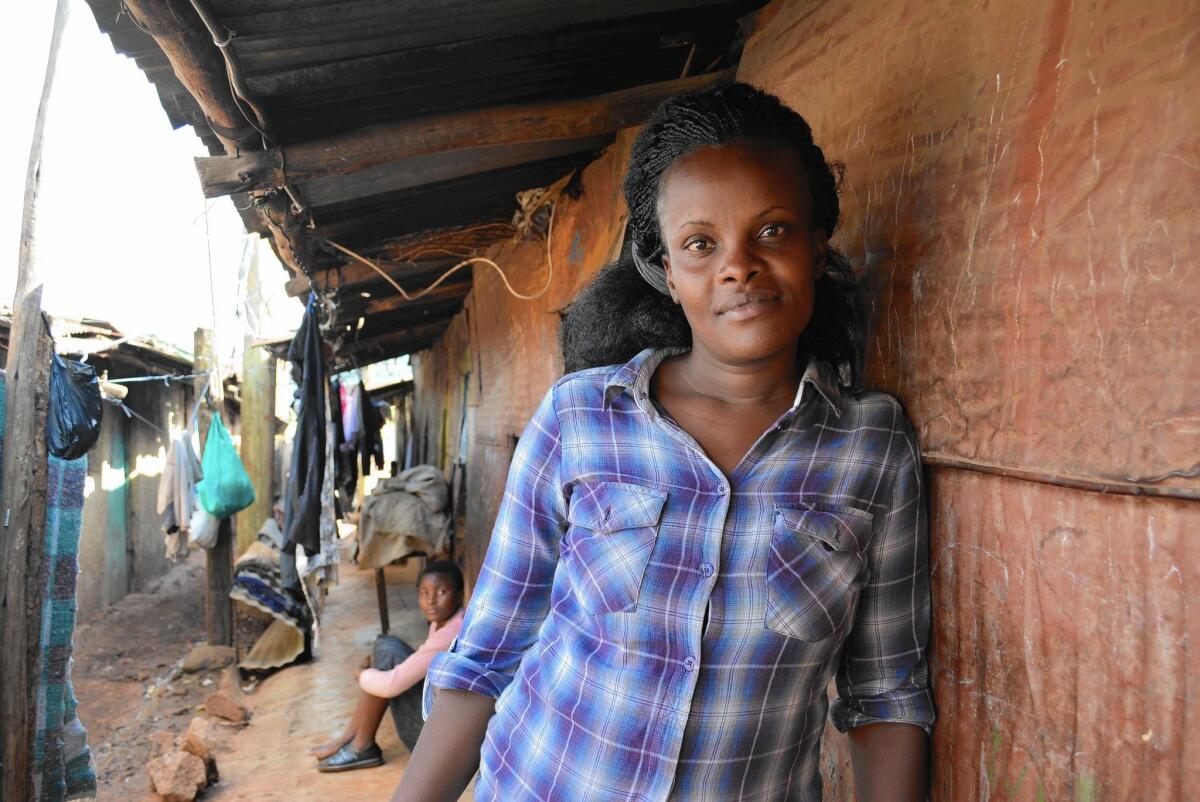A Kenyan road project is taking huge bites out of the Kibera slum

- Share via
Reporting from Nairobi, Kenya — The men came in hard hats, rubber boots and fluorescent vests.
The government had sent them to Kibera, a slum neighborhood in Nairobi, to take back what belonged to it: 24 feet and 7 inches on either side of Bombululu Langata Road, a steep, muddy track snaking past rusty, corrugated tin roofs and nests of tangled electrical wires.
They came with surveying equipment and red paint. They painted big red crosses on all the little shacks along the road: houses, shops, salons, pubs, a day care center, a shoe repair place.
A few days later, the excavator came. It crunched into the shacks, most with mud walls and tin roofs, biting off pieces like a giant munching a cookie. It left piles of rubble, timber poles toppled like straws, sheets of bent metal and people screaming in rage or weeping in despair.
It was like a mini-earthquake, only it wasn’t. It was the government widening a road earlier in the summer, to link up with a nearby bypass. The way these things are done, locals tell you darkly, is to pay off the toughest thugs, who’d otherwise be enraged and would fight the intruders, pelting them with rocks.
“They told us when you built next to the road no one tell you to build there. That one belongs to the government. So you will go look for somewhere else to put up your businesses and even your houses,” said Jane Adhiambo, who lost a small business doing cash transfers and selling phone airtime.
At one point, she said, a scuffle broke out when two dozen youths tried to clamber onto the digging machine to drag the driver off and beat him.
“The police were in plainclothes,” she said. “Then we saw them taking out handcuffs. Those youths were taken to the police station. They were told, ‘You are fighting the government and you will find the government’s hand is wide enough.’
“We don’t know what happened to those youths that were arrested.”
Local government authorities declined to comment on the complaints.
Lilian Masila’s hair salon was torn down and her neighbor, an old woman named Wacera, grew hysterical and cursed the intruders by hurling a pot at them. “Some elderly people thought that, no matter how bad the demolition was, that went too far,” Masila said.
“She even refused to go away and yesterday the [excavator] came and demolished her place. She was very angry. She cried. She even removed her clothes in protest,” Masila said. “She even took a pot and threw it down as a sign of cursing those people.
“That’s very serious. It means bad things will happen to them. My mum told me it’s a curse. They will die.”
After the initial surveying team peeled more than 8 yards from each side and left their marks, some people decided to demolish their own houses and shops, trying to minimize the loss and scrape back a few inches or feet, hastily throwing up new walls and pouring new concrete floors before the road team returned with the excavator.
The street rang out with the deafening sounds of hammering as people worked like ants repairing a nest crushed by some great boot, building new walls with tin, staking their place, closing gaps in the skins of their small dwellings.
But when the surveyors came back, they measured again. Residents are convinced that the second measurement clawed out a few more feet. Back came the excavator, and “it just knocked down those new walls,” Masila said.
Shoemaker Aloice Oduor, 63, weary and withdrawn, seems defeated, without hope. He whispers his story about the day he found a huge red cross, like a bloody slash, on the side of his little shoe repair shop.
“They’ve already earmarked my house for demolition. I could do nothing. I just picked up all my stuff and took it back to my house. I really felt bad.”
There was no hope of compensation or dignified relocation. Decades ago, when people perched on the land, built their houses and businesses, and put down deep roots, they didn’t consider it to be government land. In crowded Kibera, theirs was a prime spot.
Each demolished business means school fees and rents unpaid, and families sinking into debt.
The struggles and backslides of one generation curtail the chances of the next. Without unrelenting work, your family sinks. Adhiambo’s mother and sister depend on her support.
“In Kibera, we have been raised that you don’t just get money. You need to work for it. You have to work hard. Your hard work will make you to eat and even to sustain your life.
“If someone tells me to start again now, how am I to start?”
Because Masila’s hair salon was destroyed, customers don’t come. Her 6-year-old son, Nathaniel, comes home, sits on the floor and drinks the sweet milky tea and white bread she has ready for him. His teacher had told him that day that he wouldn’t be allowed to take his exams because Masila hadn’t paid his school fees.
Her tiny dwelling is about 5 feet wide, but she’s been told it will be cut in half when the demolition team comes back, shrinking it to an uninhabitable strip a couple of feet across.
“Tomorrow they’re coming back to do their normal job: demolishing, demolishing,” she said, sighing.
More to Read
Sign up for Essential California
The most important California stories and recommendations in your inbox every morning.
You may occasionally receive promotional content from the Los Angeles Times.











